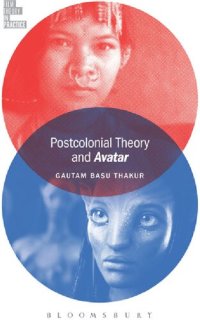
Ebook: Postcolonial Theory and Avatar
Author: Gautam Basu Thakur
- Series: Film Theory in Practice
- Year: 2016
- Publisher: Bloomsbury Academic
- Language: English
- pdf
The Film Theory in Practice series fills a gaping hole in the world of film theory. By marrying the explanation of a film theory with the interpretation of a film, the volumes provide discrete examples of how film theory can serve as the basis for textual analysis. The second book in the series, Postcolonial Theory and Avatar offers a concise introduction to postcolonial theory in jargon-free language and shows how this theory can be deployed to interpret James Cameron’s high-grossing, immensely popular, and critically acclaimed 2009 film.
Avatar is widely celebrated for its politically and culturally sensitive critique of the “West’s” neocolonial wars and exploitation of the “global south” – an allegory for (neo)colonialism – and for highlighting the plight of tribal communities throughout the world (for instance, the case of the Dongriah Kondh tribe of India). At the same time, it has been also criticized for repeating the colonialist fantasy of saving natives doomed by imperialist aggression. Intervening in this debate over how to read the film, Basu Thakur focuses on issues of representations, discourse, subalternity, and subjectivity, all of which have been central to postcolonial theory and postcolonial analyses of culture. This history will help students and scholars who are eager to learn more about this important area of theory and bring the concepts of postcolonial theory into practice through a detailed interpretation of the film.
In response to questions about the relevance of postcolonial theory in the era of globalization, Postcolonial Theoryand Avatar advocates the need to reimagine the postcolonial critical apparatus through renewing a dialogue with French Continental theory and through strengthening its ties to film and media studies. Basu Thakur argues for building a more theoretically rigorous and media specific postcolonial approach that would adequately examine the forms, modes, and guises of Eurocentrism in contemporary popular culture and intellectual discourses of the West. He charges the rhetoric of multiculturalism and tolerant pluralism (as well as the West’s self-reflexive critiques of its past and present expansionist misadventures) with obscuring the continued presence of colonial-era prejudice and narratives of subject formation. Taking James Cameron’s supposedly anti-imperialist, pro-indigenous rights, and ecologically sensitive film Avatar as an example, Basu Thakur shows how postcolonial analysis of film can reveal the hidden symptoms of Eurocentrism by moving focus away from identity politics and toward the West’s supple narratives of subject-production. The conclusion undertakes a cross-cultural analysis and comparative study of subject-production in a Bengali short story and a French film to explore these as texts interruptive of the habitual narratives of subject-production in Avatar and the West more generally.
Avatar is widely celebrated for its politically and culturally sensitive critique of the “West’s” neocolonial wars and exploitation of the “global south” – an allegory for (neo)colonialism – and for highlighting the plight of tribal communities throughout the world (for instance, the case of the Dongriah Kondh tribe of India). At the same time, it has been also criticized for repeating the colonialist fantasy of saving natives doomed by imperialist aggression. Intervening in this debate over how to read the film, Basu Thakur focuses on issues of representations, discourse, subalternity, and subjectivity, all of which have been central to postcolonial theory and postcolonial analyses of culture. This history will help students and scholars who are eager to learn more about this important area of theory and bring the concepts of postcolonial theory into practice through a detailed interpretation of the film.
In response to questions about the relevance of postcolonial theory in the era of globalization, Postcolonial Theoryand Avatar advocates the need to reimagine the postcolonial critical apparatus through renewing a dialogue with French Continental theory and through strengthening its ties to film and media studies. Basu Thakur argues for building a more theoretically rigorous and media specific postcolonial approach that would adequately examine the forms, modes, and guises of Eurocentrism in contemporary popular culture and intellectual discourses of the West. He charges the rhetoric of multiculturalism and tolerant pluralism (as well as the West’s self-reflexive critiques of its past and present expansionist misadventures) with obscuring the continued presence of colonial-era prejudice and narratives of subject formation. Taking James Cameron’s supposedly anti-imperialist, pro-indigenous rights, and ecologically sensitive film Avatar as an example, Basu Thakur shows how postcolonial analysis of film can reveal the hidden symptoms of Eurocentrism by moving focus away from identity politics and toward the West’s supple narratives of subject-production. The conclusion undertakes a cross-cultural analysis and comparative study of subject-production in a Bengali short story and a French film to explore these as texts interruptive of the habitual narratives of subject-production in Avatar and the West more generally.
Download the book Postcolonial Theory and Avatar for free or read online
Continue reading on any device:

Last viewed books
Related books
{related-news}
Comments (0)